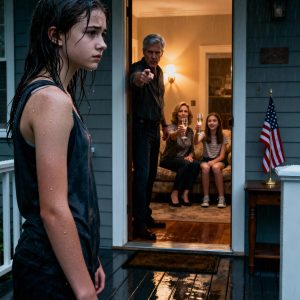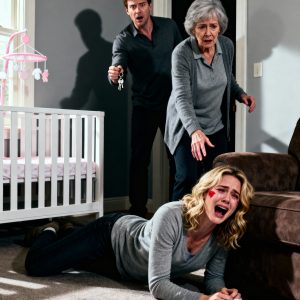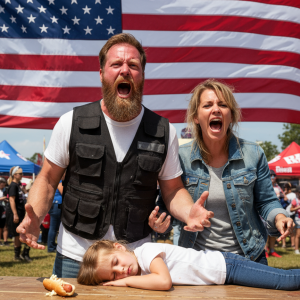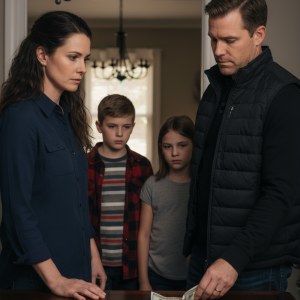We were just stopping for lunch. Nothing special—just a quiet roadside diner off the Oregon highway, somewhere between nowhere and the next gas station. I was trying to coax my six-year-old to finish his chicken fingers, distracted by cracked vinyl booths and the syrupy smell of pancake syrup that never quite leaves a place like this.
Then my son looked up and pointed across the room.
“Daddy… that waitress looks just like Mommy.”
I chuckled—reflexively. “That’s impossible, bud.” Because Amara, his mother, had died three years ago. A boating accident in Baja. I had ID’d the ring myself. I’d stood on a cliff and watched her ashes scatter with the wind.
But then… I looked.
She had darker hair now—cut short, uneven—but her movements, the way she tilted her head, the way her shoulders curved forward slightly as she wiped the table… they were unmistakable. My chest tightened. I felt like my whole body had gone still.
I didn’t say a word to my son. I just stood up and walked toward her, each step unsure, afraid of what I’d find—and more afraid of what I wouldn’t.
She looked up.
For one fleeting moment, recognition cracked across her face like lightning on glass. Then it was gone.
“Can I help you?” she asked, her name tag reading Leona.
Her eyes danced away from mine.
“You look like someone I knew,” I said, voice thick.
She gave a small shrug. “People say that sometimes.”
But her voice shook. Just barely.
From behind me, my son piped up again.
“Mommy sings that song too. The one Daddy was humming in the car.”
Her tray slipped.
It clattered against the table, nearly crashing to the floor. She flinched, a tear swelling in the corner of her eye. Then she turned and bolted through the kitchen door like she’d seen a ghost.
“Leona?” a cook shouted after her. “You okay?”
She didn’t answer.
My son tugged my hand. “Was that really Mommy?”
I crouched beside him. “Maybe,” I said. The truth was too big for him to carry just yet.
We paid the check. Left the pie. I circled the block—twice—waiting, watching. Then I saw her: jeans, hoodie, sneakers, slipping out the back door and vanishing down a side street like someone practiced in leaving.
She didn’t drive. Just walked fast until she disappeared into a blue-painted apartment complex on the edge of town.
I didn’t follow. Not that night.
The next morning, after dropping my son off at a kids’ museum program, I returned and knocked.
No plan. Just… knocked.
It took her a while, but when the door finally creaked open—there she was.
No wig. No name tag. No disguise.
Just Amara.
“How?” I asked. “Why?”
She stared like I was the one who’d come back from the dead. Her eyes were sunken. Hair shorter. Paler. But still her. Still the woman I had mourned.
“I faked it,” she whispered, hands trembling. “I faked my death.”
The world tilted.
“Why?” I asked again.
She swallowed hard. “Because I was scared. Not of you. Never you. Of me. Of what I was becoming.”
We sat across from each other. The room was clean, but nearly empty. A photo frame was turned face-down on the table.
“I had everything,” she said. “A son. A loving husband. But I was losing myself. You were building a future, but I didn’t know how to be part of it anymore.”
I was speechless.
She continued, voice cracking.
“I tried to tell you. But every time I opened my mouth, you were already three steps ahead. Launching a business. Planning a new life. I didn’t want to be the selfish one.”
“So you disappeared.”
“I didn’t mean for it to go that far. But the accident… the chaos… no body. I saw my way out. And I took it.”
I looked at her, at the woman I had grieved, buried, and missed in my sleep. My mind screamed at me to be angry. To walk out. But my heart just hurt.
I asked why she worked at that diner, in that town.
She shook her head. “I didn’t know you’d be there. I’ve been here six months. Just surviving.”
I told her about our trip—about stepping back from everything to spend the summer with our son.
“So what now?” I asked.
She didn’t have an answer.
Neither did I.
The days that followed were a blur. She met us at the park. Joined us for ice cream. Her hands trembled when our son hugged her, but she didn’t let go. We didn’t tell him everything—just that Mommy was okay, and she needed time to feel better.
Some moments felt like old sparks flickering back. Others were awkward silences and sidelong glances.
The past didn’t vanish. But something in us wanted to build forward.
One evening, I found her sketching in the park. She still drew. I had forgotten.
She looked up at me, unsure. “I want to come back. If you’ll let me.”
I nodded. Slowly. “Not to what we had. But maybe… something new.”
She smiled. Small. Earnest.
We drove back to Portland. Together.
It wasn’t easy.
There was therapy. For her. For me. For our son.
We co-parented. Stumbled through apologies. She found work at an art center. I shifted to part-time. Slowly, clumsily, we began again.
A year later, over dinner, I asked the question that had haunted me.
“What made you come back? That day. After you ran from the diner?”
She smiled.
“Because your son was humming our wedding song. And I realized… I couldn’t walk away from that twice.”
We’re not who we were.
But we’re something new. Stronger. Wiser. Fragile, still—but honest.
Because sometimes, the people we love don’t vanish to hurt us. They disappear because they’re drowning. And when they return changed—truly changed—sometimes there’s a path forward.
Forgiveness isn’t forgetting. It’s choosing to believe in what can grow from the ashes.
So if this story stirred something in you, share it. Someone out there may be quietly waiting for a reason to come home.





